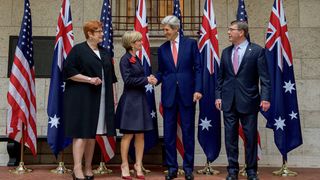In this report from the US Studies Centre's Alliance 21 Program, Elsina Wainwright looks at the role of the US-Australia alliance in the rapidly changing Indo-Asia-Pacific region. Wainwright recommends that ANZUS becomes more enmeshed in the network of regional relationships and institutions, that Canberra be more assertive in Washington on engagement with China and that the Australian Treasurer and US Treasury Secretary be included in AUSMIN meetings.
Key findings:
- The United States’ presence in the Indo-Asia-Pacific is transforming from a traditional alliance network (of Japan, South Korea, the Philippines, Thailand and Australia) into a web of strengthened alliances, new partnerships and creative linkages.
- Washington must manage this transformation carefully, so its alliance network maintains a deterrent function and reassures allies, but does not exacerbate US-China tensions.
- The changing regional setting has increased ANZUS’ value to both Australia and the United States. However, ANZUS has emerging fault lines that need to be addressed, including the risk that Australia’s and America’s strategic objectives might diverge.






